Canada's worst-selling vehicles in 2025's first-half
We've rounded up the 10 lowest-volume vehicles during 2025’s first six months and 10 that experienced the worst year-over-year declines

Article content
Picture a scenario in which your favourite automotive manufacturer introduced a quirky electric vehicle with moderately acceptable range, decent power, and an unusual design. For a couple of years, Canadian sales figures weren’t actually as low as you expected. Why? Well, the government was helping people buy that electric vehicle, courtesy of the federal government’s Incentives for Zero-Emission Vehicles (iZEV) program, which kicked in $5,000 at the point of sale.
With more money – lots of money, in some instances – coming from the provinces, electric vehicles didn’t have to be that expensive. Sure, most electric vehicles didn’t become best sellers. But EV market share did soar from 3.6% in 2021 to 10.9% in 2024.
Midway through the first-quarter of 2025, however, the iZEV program ran out of money and Q1 EV market share fell to 6.2%. The rug was pulled out from under many electric vehicles; many of which didn’t just stumble; they crumbled. Indeed, many now make an appearance on our list of the worst-selling vehicles in the country.
To compile Driving’s Worst Sellers lists, we exclude premium brand vehicles, officially discontinued models, vehicles without a rear seat, and vehicles with base MSRPs above $100,000. It’s not a flawless system, but it effectively filters out dozens of niche nameplates that are destined to be worst sellers simply because they were never intended to be high-volume vehicles. Unfortunately, without sales reporting from Ford and Tesla, those vehicles are excluded, as well.
Those which remain form two often overlapping groups: the 10 lowest-volume vehicles during 2025’s first six months and the 10 vehicles that experienced the worst year-over-year declines compared with 2024’s first-half.
Canada’s worst-selling vehicles in 2025’s first-half (by volume)
10. Jeep Wagoneer: 732, down 10%
Breaking into a relatively low-volume segment that is so completely dominated by one manufacturer was never going to be an easy task for Jeep. The brand didn’t make it any easier on themselves by chasing an elevated price point. Of the Wagoneer’s full-size SUV category, 68% was held by General Motors in 2024. In 2025’s first six months, the Chevrolet Tahoe and Suburban along with GMC’s Yukon and Yukon XL combined for 7,910 sales.

9. Jeep Gladiator: 660, down 57%
In 2019, Canadians acquired over 400,000 pickups and 25,659 Jeep Wranglers. The theory behind the Gladiator, therefore, completely adds up. If Canadians love pickup trucks, and if Canadians love Jeep Wranglers, Canadians will love the concept of a Jeep Wrangler pickup. The Gladiator, however, peaked at only 4,985 units in 2022 and then began to crumble, sliding 46% in 2023 and a further 25% in 2024 before this year’s 57% first-half decline.
8. Toyota Sequoia: 535, up 5%
Provided Toyota is successfully selling Tundras in large numbers – 2024 was a record year for the Tundra pickup in Canada – the Sequoia is destined to hum alongside despite limited demand (and limited availability). Now in its third generation, the Sequoia is tracking toward its second consecutive four-digit sales year after averaging fewer than 600 over the previous decade.
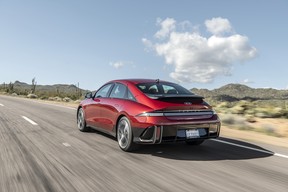
7. Hyundai Ioniq 6: 534, down 63%
The tables have turned. A year ago, the electric Ioniq 6 and the rather more conventional Sonata combined for 2,198 Hyundai sedan sales in the first-half of 2024. The duo has fallen 17% since then despite the Sonata’s 70% uptick. With or without rebates – and we’re now in a without phase – the Ioniq 6 operates in a very narrow niche due to its bodystyle, its powertrain, and its avant-garde design.
6. Nissan Armada: 491, up 69%
The third-generation Nissan Armada suffers from the same plight as the Toyota Sequoia and Jeep Wagoneer: it’s trying to stroll through General Motors territory without a General Motors badge. True, this new third-generation Armada, operating with a turbocharged V6 rather than a large V8, is making headway in comparison to the Armada’s performance from last year. But this is extremely low-volume territory. Even setting aside the long-wheelbase options, GM is selling 800 Tahoes and Yukons per month, roughly 10 times the Armada’s total.

5. Honda Prologue: 477, up 5,863%
Not surprisingly, a GM-based Honda electric crossover that’s only available in British Columbia, Quebec, and Ontario is a decidedly uncommon purchase for Canadian buyers. Only 0.7% of the Hondas sold in Canada so far this year are Prologues.
4. Dodge Charger: 422, down 27%
When you hear Charger, it’s likely that you’re thinking of the four-door twin of the Chrysler 300 that arrived as a sixth-generation Charger in 2006 (and then ran for 13 years in seventh-gen form.) It’s possible that you’re thinking of the new Charger, intended to eventually be made available either as a coupe or sedan with either electric or ICE powertrains. Of the 422 Chargers sold in the first-half of 2025, 62 were leftover LDs; 360 were new LB models.
3. Volkswagen ID.Buzz: 349
Volkswagen Canada sold its first 117 copies of the new electric Buzz van in the final quarter of 2024. The pace of sales hasn’t really shifted since then, with 183 sales during the first-quarter of 2025 and only 166 sales in Q2. The ID.Buzz doesn’t exactly sit in the heart of the people-mover market – and not just because of its EV powertrain. ID.Buzz pricing starts at $80,595.
2. Toyota Crown: 211, down 58%
There is a Crown in which Canadians have at least a measure of interest, but it’s not the sedan. The newer Crown Signia wagon-like crossover, which went on sale in the third-quarter of last year, generated 1,017 sales in the first-half of 2025, nearly five times the total of the non-Signia Crown. History suggests that, no matter how much automakers try, demand for vehicles such as the Toyota Crown, Volvo S60 Cross Country, or Subaru Outback SUS just doesn’t really add up.
1. Nissan Leaf: 80, down 93%
Nissan has already revealed the all-new third-generation Leaf. During the transition period, Nissan’s expectations for the Leaf all but disappear as the company winds up the next Leaf’s launch. Nissan did, however, manage to increase its sales of the company’s other EV, the Ariya, by 31% to 1,680 units in 2025’s first six months.
Canada’s worst-selling vehicles in 2025’s first-half (by year-over-year change)
10. Volkswagen ID.4: down 42% to 3,105
Of the six fastest-falling vehicles in Canada in early 2025, six are all-electric. Clearly the EV market was highly dependent on direct-to-consumer government rebates, without which the bottom has fallen out for many models. Volkswagen’s ID.4 sales actually tumbled 61% to only 1,176 units in the second-quarter.
9. GMC Terrain: down 42% to 6,272
GM’s sales story through the first-half of 2025 has, at its core, the success of SUVs/crossovers across four brands. The Terrain, somehow, does not fit into that story at all. Terrain excluded, GM’s utility vehicles recorded a massive 28% jump to 70,404 units. The third-generation Terrain that launched last year hasn’t had the broadest of trim level options. It’s also limited in the powertrain department to one engine, a 175-horsepower 1.5-litre turbo that will not set hearts on fire.
8. Toyota Camry: down 54% to 3,276
Despite a 54% slowdown, the Toyota Camry is still Canada’s best-selling midsize car. (That shows just far ahead it was last year.) Scant availability, a persistent Toyota problem, is clearly a problem for the Camry, which is now available exclusively with a hybrid powertrain. Camry market share in the midsize sector fell from 52% at the halfway point of 2024 to 41% in 2025.
7. Toyota bZ4X: down 54% to 1,224
Although Toyota’s first kick at the bZ4X can wasn’t particularly convincing, the 2026 bZ model may well tell a different tale. There’ll be more range, more speed, and faster charging. In the meantime, the current bZ4X is in the same no-EV-rebate boat that’s capsizing vehicles such as the Kia EV6, Hyundai Ioniq 6, and Volkswagen ID.4. Meanwhile, the bZ4X’s Subaru twin, the Solterra, followed up a strong Q1 with a 53% drop in Q2.
6. Jeep Gladiator: down 57% to 660
This is not the beginning of the Jeep Gladiator’s downward trend. A 57% year-over-year slide is just the tip of the iceberg. Compared with the first-half of 2022, Gladiator volume is down 80%. The Gladiator ended that year accounting for 8.3% of Jeep’s Canadian sales; that’s now down to 3.8%.
5. Toyota Crown: down 58% to 211
The Toyota Crown arrived in 2023 to little acclaim and found little demand. Then in 2024, Crown volume plunged 33%. 2025 is tracking to be much worse. Granted, Toyota’s total Crown sales – including the more desirable Signia – are actually up 142% compared with the first-half of 2024.
4. Hyundai Ioniq 6: down 63% to 534
Hyundai Canada can sell EVs, as it’s proven with the very popular Kona EV and Ioniq 5. In 2024, Hyundai sold 9,179 electric Konas plus 13,484 Ioniq 5s. The Ioniq 6, on the other hand, is operating on another spectrum, with 2,671 sales in 2024 and a much, much slower sales pace in 2025. Hyundai’s only electric sedan is on track for fewer than 1,000 total sales this year.
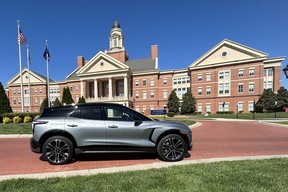
3. Chevrolet Blazer EV: down 64% to 901
The names are similar; the vehicles are not. The Chevrolet Blazer is a conventional crossover; the Blazer EV is an Ultium-based crossover that was built with the intent that it be an EV and only an EV. Both are struggling to match the sort of SUV sales growth GM is experiencing across almost its entire lineup – Blazer sales are down 25%; the Blazer EV has lost 1,628 sales in its 64% year-over-year drop.
2. Kia EV6: down 78% to 762
The speeds on Electric Avenue have slowed dramatically with the disappearance of the federal government’s incentive program, and the Kia EV6 is clearly paying the price. At the halfway point of 2024, Kia Canada had delivered 3,445 EV6s – that figure has fallen by 2,683 units.
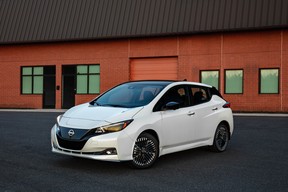
1. Nissan Leaf: down 93% to 80
An entirely new third-generation 2026 Nissan Leaf is an important symbol for the electric vehicle industry. Remember, the first-generation Leaf was the car that marked the first real electric push into the mainstream. The Leaf, unfortunately, never properly took off aside from one year, 2018, when 5,735 were sold in Canada. Don’t expect a return to those figures when the 2026 model arrives.
Sign up for our newsletter Blind-Spot Monitor and follow our social channels on Instagram ,Facebook and X to stay up to date on the latest automotive news, reviews, car culture, and vehicle shopping advice.













Postmedia is committed to maintaining a lively but civil forum for discussion. Please keep comments relevant and respectful. Comments may take up to an hour to appear on the site. You will receive an email if there is a reply to your comment, an update to a thread you follow or if a user you follow comments. Visit our Community Guidelines for more information.